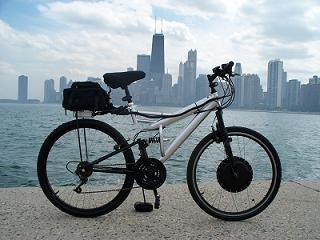
One of John LaStarge’s electric
mountain bikes.
In 2008, John LaStarge was inspired to sell battery-operated bikes in Chicago. He converted a regular mountain bike into an electric version and sold it to a relative, but then was called up for a second tour of duty to Afghanistan with the Illinois National Guard.
When he returned in August 2009, Mr. LaStarge was ready to start building more electric wheels. Armed with a 10-page business plan, the 27-year-old had a tough time persuading bankers to give him a loan to get his new venture, Chicago Electric Bicycles LLC, off the ground. Despite those obstacles, Mr. LaStarge opened a narrow storefront on Grand Avenue in West Town last spring, and the orders have been coming in ever since.
The company, which consists of Mr. LaStarge and two part-time employees, currently offers four models of custom-built electric bikes, including a comfort cruiser, a lightweight fold-up and a sleek mountain bike. They range in price from $799 to $1,600, and riders can zip around at top speeds of a little over 20 mph. Mr. LaStarge also can convert some regular bikes people already own to work with a battery, depending on frame size.
Crain’s recently talked to Mr. LaStarge about why he’s building his own battery-operated two-wheelers and how he plans to expand his business in Chicago and beyond.
Crain’s: How did you identify a need for electric bikes in Chicago, and why did you decide to build them yourself?
Mr. LaStarge: In the spring of 2008, gas prices shot up to about $4.50 a gallon in Chicago and angry CTA commuters were complaining about bad service and high costs. I thought: There’s got to be another way to get around this city. I’ve always loved bicycles, so I looked up electric bikes online and bought one from overseas. The battery only lasted three months and they didn’t offer any services or support. So I decided to build my own. The lithium ion batteries I use on most of my bikes can last over 1,000 charge cycles.
Crain’s: How did you get your start-up financing?
Mr. LaStarge: The banks didn’t help me at all. I went to Fifth Third Bank and (J. P. Morgan) Chase Bank. They both denied me even though I had a perfect credit rating, no debt, no student loans. Citibank offered me $30,000 at a 10% interest rate, but I hoped to do better than that. In the end, I saved a lot of my own money from Afghanistan and an angel investor — a relative — met me halfway with a loan so I could get started.
Crain’s: You launched two new products this summer. Tell us about them.
Mr. LaStarge: I got so many requests for mountain bikes, and I finally found one that had the right suspension. I took all the electrical components and put them on the bike to convert it to electric. I have two versions: a silver one that I sell for $1,600 with a lithium ion battery — it’s almost identical to one they sell at Kozy’s (Cyclery) for about $2,500. Then I have a black one that comes with a lead acid battery that lowers the cost, and it sells for $900.
I also started selling the Velo Mini in May, but I don’t build that one. I wanted to find the most compact, lightest bike possible, and it was beyond my means to build a bike of that size. I found a company in California that had a good one and I became a distributor for them.
A Velo Mini
Crain’s: Who’s purchasing these bikes from your company?
Mr. LaStarge: Some people who buy my bikes have told me they’re environmentally conscious and they want to reduce their carbon footprint. I also have customers who want to ride their bikes to work but don’t want to show up sweaty, so they ride the electric bike in the morning and they can pedal their bike after work by switching off the battery. Then there’s other people like myself who are just fed up with the CTA and waiting for buses. I know I’ll get more customers if the CTA raises rates or continues to cut service. And as gas prices continue to rise in the future, I’m sure you’ll see more people looking for alternative transportation.
Crain’s: Who do you consider your competition and your potential partners?
Mr. LaStarge: Kozy’s sells electric bikes and so does Best Buy. Best Buy doesn’t have anyone to fix them on the spot if they need it, and they’re expensive. Believe it or not, regular bike stores are my allies. I go to two or three of them in the city to fix customers’ brakes and other small things I can’t do in my storefront. I envision bike stores as potential partners. They tell me they don’t want to sell electric bikes because they’re too complicated and they don’t want to deal with the problems or the insurance issues of carrying them.
Crain’s: What are your expansion plans?
Mr. LaStarge: I’ve heard that lending has thawed out, so this winter we’ll focus on trying to get a business loan from a local bank. I might hire two or three more employees and open a second store in the suburbs. Everything revolves around gas prices. When they go up, we’ll get more interest in our bikes. The funny thing is a lot of people don’t even know electric bikes exist.
We haven’t done much advertising, except for online with Google and Yahoo, and old-fashioned fliers we put on people’s cars. I’m planning to advertise all over Chicago if I have a bigger capital budget next year.
We’ve also done a few city bike tours with small groups, but we hope to offer more next year, like the Segway tours at the lakefront. Our tours will be less expensive and people will be able to go farther. I’m going to try to get a spot at Navy Pier or the Planetarium, but first I have to go through all the bureaucracy with the city.


